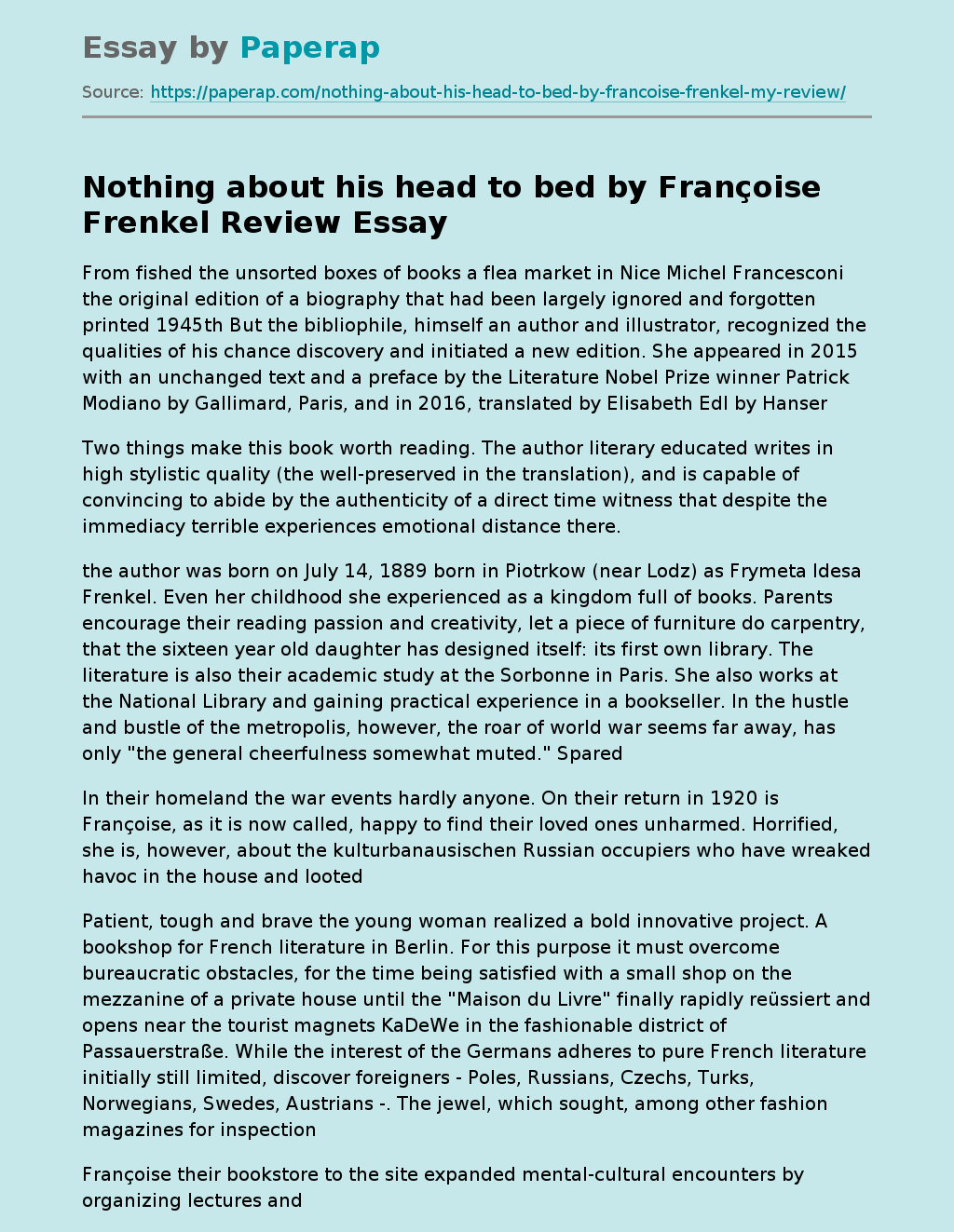Nothing About His Head To Bed By Françoise Frenkel Review
From fished the unsorted boxes of books a flea market in Nice Michel Francesconi the original edition of a biography that had been largely ignored and forgotten printed 1945th But the bibliophile, himself an author and illustrator, recognized the qualities of his chance discovery and initiated a new edition. She appeared in 2015 with an unchanged text and a preface by the Literature Nobel Prize winner Patrick Modiano by Gallimard, Paris, and in 2016, translated by Elisabeth Edl by Hanser.
Two things make this book worth reading.
The author literary educated writes in high stylistic quality (the well-preserved in the translation), and is capable of convincing to abide by the authenticity of a direct time witness that despite the immediacy terrible experiences emotional distance there.
the author was born on July 14, 1889 born in Piotrkow (near Lodz) as Frymeta Idesa Frenkel. Even her childhood she experienced as a kingdom full of books. Parents encourage their reading passion and creativity, let a piece of furniture do carpentry, that the sixteen year old daughter has designed itself: its first own library.
The literature is also their academic study at the Sorbonne in Paris. She also works at the National Library and gaining practical experience in a bookseller. In the hustle and bustle of the metropolis, however, the roar of world war seems far away, has only “the general cheerfulness somewhat muted.”
In their homeland the war events hardly anyone. On their return in 1920 is Françoise, as it is now called, happy to find their loved ones unharmed.
Horrified, she is, however, about the kulturbanausischen Russian occupiers who have wreaked havoc in the house and looted
Patient, tough and brave the young woman realized a bold innovative project. A bookshop for French literature in Berlin. For this purpose it must overcome bureaucratic obstacles, for the time being satisfied with a small shop on the mezzanine of a private house until the “Maison du Livre” finally rapidly reüssiert and opens near the tourist magnets KaDeWe in the fashionable district of Passauerstraße. While the interest of the Germans adheres to pure French literature initially still limited, discover foreigners – Poles, Russians, Czechs, Turks, Norwegians, Swedes, Austrians -. The jewel, which sought, among other fashion magazines for inspection.
Françoise their bookstore to the site expanded mental-cultural encounters by organizing lectures and readings, accompanied by entertaining musical and theatrical performances. Full of optimism, she hopes for a “possible understanding between peoples”. Soon comes the intellectual Francophile elite and out -. Claude Anet, Henri Barbusse, Julien Benda, Madame Colette, André Gide, Aristide Briand.
The policy but wants Françoise offer no podium. She already is feeling the increasing arbitrariness of the future rulers in Germany: police checks, seizure indexed books. Following the adoption of the Nuremberg Laws (1935), the “Maison du Livre” is still tolerated under the protection of French publishers, but the Jewish owner recognizes the signs of the times and begins to dissolve their business.
In August 1939 Françoise Frenkel begins its flight, first to Paris, then the German occupation giving way to Avignon, in December 1940 after Nice. Since the Vichy regime proves with the prosecution and extradition of Jews as an extended arm of the Nazis in Paris, there is no security here. The author tells of the fate of many castaway who go used their property to escape the discovery sucked by corrupt helpers were betrayed by French collaborators, police raids were victims. Françoise is even strong enough to save themselves against all risks? When she accidentally sees how Jews are crammed into overcrowded buses and taken away, she is tempted to exclaim: “Take me with you, I am one of them.” But then she wonders, “Who would benefit this sacrifice What could change it what??”
Françoise has friends in Switzerland, which have their visas and money to come. However, no barrier will open for them. Three times she attempted the dangerous border crossing, is finally caught and arrested. The friends she has to thank that she is released from prison, can repeatedly dip briefly into supposedly secure hiding and finally reached illegally to Switzerland in June 1943. ‘
It’s impressive how the couple Marius and many despite the threat of reprisals always up to the detention afford other “men of good will” fully support. “Here you are at home, that is, in good French. Nothing will happen to them as long as we are the masters here. As for the future, and recompense, you can rely on yourself, or my name Marius!”
Françoise Frenkel’s autobiography is free of maudlin sentimentality, free from hatred and resentment against the oppressors, the collaborators, xenophobes and anti-Semites. As bizarre as cruel and inhumane the events are, but it is even room for cheerful episodes, such as Françoise fake papers receives a septuagenarian French woman and a wart emblazoned on the passport photo as a personal characteristic chin. How should Françoise, middle, this requirement will be fifty righteous?
Nothing About His Head To Bed By Françoise Frenkel Review. (2019, Nov 18). Retrieved from https://paperap.com/nothing-about-his-head-to-bed-by-francoise-frenkel-my-review/

